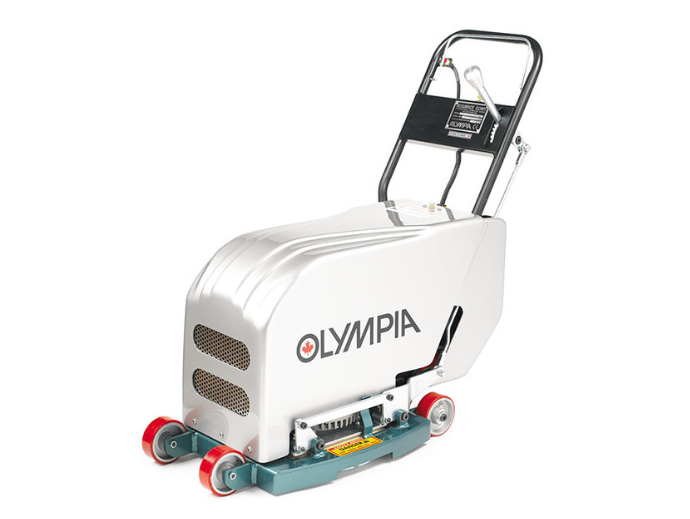Green Fund Supports Transition to Electric Equipment at Penn Ice Rink

The Penn Ice Rink has received a Green Fund grant to transition from fuel-powered to electric equipment. The grant enabled the purchase of a battery-powered electric ice edger, replacing the fossil-fuelled one. This move signifies a significant step in reducing the rink's carbon footprint, enhancing indoor air quality, and promoting sustainability.
Green Fund Supports Transition to Electric Equipment at Penn Ice Rink
The Penn Ice Rink has received a Green Fund grant to transition from fuel-powered to electric equipment. The grant enabled the purchase of a battery-powered electric ice edger, replacing the fossil-fuelled one. This move signifies a significant step in reducing the rink's carbon footprint, enhancing indoor air quality, and promoting sustainability.

The latest recipient of the Green Fund grant is the Penn Ice Rink, which has been awarded $7,027 to kickstart its transition from fuel-powered equipment to electric alternatives. Specifically, this funding has facilitated the purchase of a battery-powered electric ice edger to replace its current fossil-fuelled edger, marking a crucial shift toward reducing the rink's carbon footprint, improving its indoor air quality, and enhancing its overall sustainability practices.
The Penn Ice Rink project is a testament to the impact of the Green Fund, which has supported a total of 76 projects since its inception, totaling more than $1.3 million in awards. The Green Fund, established in 2009 and administered by Penn Sustainability and funded by the division of Facilities and Real Estate Services, aims to seed innovative environmental projects proposed by faculty, students, and staff. With grants of up to $30,000 available per project, the Green Fund has been instrumental in driving forward innovative sustainability initiatives across the campus.
The selection of the Penn Ice Rink project for Green Fund support highlights its alignment with the goals and objectives outlined in Penn's Climate and Sustainability Action Plan. By investing in electric equipment, the rink aims to reduce its reliance on fossil fuels, thereby contributing to Penn's broader efforts to mitigate climate change and promote environmental stewardship.
Penn Ice Rink chose to donate its fossil-fuelled ice edger to the Laura Sims Skate House in Cobbs Creek Park of West Philadelphia. Prior to donation, the edger underwent several enhancements, with the most notable being its conversion to utilize an alternative, ethanol-free, low-emission fuel source. This donation not only extends the lifespan of the equipment but also enables Laura Sims Skate House to enhance its operations and sustainability practices. By repurposing the ice edger, Sims Skate House can reduce its reliance on outdated, less efficient equipment, furthering the goal of environmental responsibility in the local community.
Pictured left to right: Rob Harkins, Director of Penn Ice Rink; Mike Petrocelli, Operations Manager of Penn Ice Rink; William “Bill” Richards, Assistant Manager of Penn Ice Rink; Bill Salvatore, Deputy Commissioner of Programs; Alexander Hughes-Taylor, Acting Aquatics Coordinator; Will Kenner, Laura Sims Facility Supervisor; Austin Studner, Penn Sustainability Analyst
Notably, the transition to electric ice edging equipment represents just one facet of the Penn Ice Rink's broader sustainability strategy. Moving forward, the rink intends to explore additional opportunities for reducing its environmental impact, including transitioning its fossil-fuelled ice resurfacer, frequently referred to as a Zamboni®, to electric. Transitioning to an electric ice resurfacer, would result in zero tailpipe emissions, reducing air pollution both inside the rink and in the surrounding community. This improves air quality for skaters, staff, and the surrounding community. Additionally, electric ice resurfacers are quieter than their fossil-fueled counterparts, creating a more enjoyable experience for patrons and reducing noise pollution. Moreover, by eliminating the need for gasoline or diesel fuel, electric ice resurfacers help decrease the rink's carbon footprint and reliance on finite fossil fuels, contributing to long-term environmental sustainability.
As the University of Pennsylvania continues to prioritize sustainability initiatives, the Green Fund remains a vital resource for catalyzing innovative projects that have a tangible impact on campus and beyond. Through collaborative efforts and strategic investments, Penn is leading the way toward a more sustainable future for the entire university community.
In 2019, the University’s Class of 1923 Ice Rink received a $8.2 million renovation made possible by collaboration between the Penn Ice Rink and Ed Snider Youth Hockey Foundation. This included upgrades to lighting, heating, cooling and electric and enhancements to enable the complex to extend to year-round operation. Learn more about Penn Ice Rink’s over half-century’s service to the University and Greater Philadelphia communities.